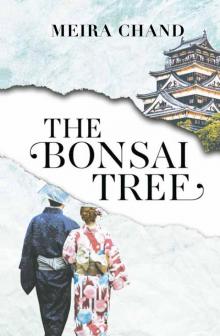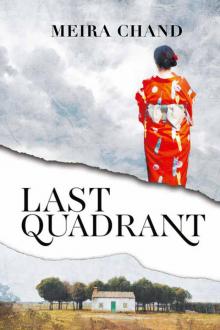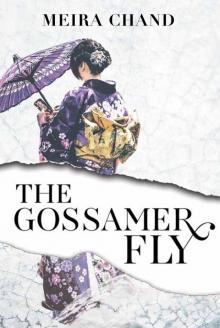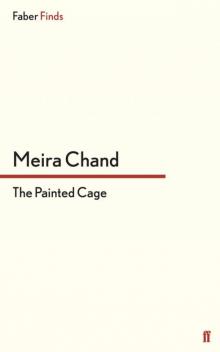- Home
- Meira Chand
Last Quadrant Page 4
Last Quadrant Read online
Page 4
‘I want to go home,’ she had cried.
‘Don’t be silly, Mother. This is home. That rickety old place was most unsafe and no longer practical. No, Nate has quite surpassed himself with this. Now, is there anyone you would like to add to the housewarming guests?’ But of course there was not, and her daughter knew it. All Maud’s contemporaries were dead.
From the shore she heard the sound of waves, endlessly folding and unfolding. Around her flat walls stared down, on her lap the heavy tray held her captive. She saw her own hand then on the sheet and did not recognise it at first: a sinewy brown stained stick. Was this her hand? It bore no resemblance to the hands she remembered. I am old, she thought suddenly. For she recalled a birthday cake some time before, she remembered pink iced numbers upon it. She moved back in the bed in fear. I am old, she thought again, and the words splintered into light.
She tried to sit up but her body was heavy and would not obey. Slowly she drew her legs up, and the tray slipped from her lap. The crash cut about in her head. She dared not open her eyes or look, just lay waiting, imagining the mass of half boiled yolk and eggshell on the carpet.
‘Geraldine.’ Nobody came.
7
Before her mirror in the bedroom Geraldine Cooper frowned, and listened to her mother call.
‘Geraldine.’
She must wait. She must learn to wait, Geraldine Cooper said to herself. For I have many things in my life, responsibilities, a home to run. Many people are dependent upon me, upon my abilities. She thought of Eva Kraig’s orphanage, the hospital, all the committees. I cannot sacrifice my life upon my mother’s altar. I must keep my priorities straight. If things get too bad, we will employ a nurse, and maybe another maid.
‘If things get too bad, Nate, we must employ a nurse.’ She tilted the long oval mirror on its stand before her, and looked critically at the judgment thrown up. Behind her reflection Nate Cooper appeared to the side of the mirror, sitting slackly in a chair. He crossed an ankle on a knee and began to tie his laces, the blood strained in his face. Geraldine’s eyes hardened. ‘I said, if things get too bad, Nate, we must employ a nurse.’
‘Sure, Honey, okay,’ muttered Nate, still struggling with his shoes. Light from the window behind glistened on grooves of hair criss-crossing his balding skull. The sight filled Geraldine with repulsion. She turned her eyes away.
‘Yes. A nurse would be just the thing. Or perhaps a companion with some nursing experience. I shall inquire, I shall go into the matter. For sooner or later there will be a need. I see it coming.’ She stared at herself in the mirror, turning her plump profile this way and that.
‘There will be the necessity of some retrimming on this, some new lace about the neck.’ The dress smelled of time, of mothballs and rain, of candles and pianos. My grandmother’s dress, a hundred years old, she would tell them all proudly. A real centenary dress for the centenary of the club.
While cleaning the attic of the old house before they moved away, she had found the dress in a mould-stained trunk. And knew at once, even though it had been several years before, she would wear it on that day. For she had begun to plan the centenary even then, planned it really for the dress. She had not, if she was honest, thought of the centenary until then. But she did not tell the club committee; nobody knew of the dress. It would be a surprise. And the committee had been unanimous in electing her to plan it all. ‘Nobody else has your touch, Geraldine. Just look what you did for the Tennis Tournament Ball. Who else could have thought of all that?’
‘I have not been to a school for club functions. I just use my imagination, that’s all. I think somebody else should have a chance,’ Geraldine had replied and she knew they would not agree.
She had repacked the dress carefully and sent it down here, to their new house. A little out here, a little out there, and it would fit. She held her breath, straining in the tight dress. Released in the mirror the red velvet gown palpitated about her body and pushed up above it, supported on whale bones, the substance that was Geraldine. It spilt out, thick and smooth as arum, an eiderdown of flesh. In her fifties, she had recently and comfortingly read, a woman could still be attractive, in the mature yeasty way no young girl had. I shall go on a diet, thought Geraldine Cooper. I shall eat grapefruit and yoghurt and nothing else. For at least a whole week, or maybe five days.
In the mirror Nate Cooper was slouched in the chair, writing on an envelope, columns of calculations. In the mirror she saw the scratched pattern of figures. Nate’s fingers bunched tightly round his pen. He blew cigarette smoke from his nose and ignored her. His eyes were inward looking things, and already at eight-thirty in the morning. Geraldine speared him a look, pursing her small mouth and whirling to face him. The heavy dress swished pleasantly about her ankles.
‘Business, business, nothing but business. It’s too early yet for work. I’ll not have it. And your coffee is cold.’ She pointed to the chalky skin on a brimming cup. ‘You are well into the coronary years, Nate, you must learn to relax, get away from your work.’ She would not, she decided, be intimidated. She would not be the one to ruin the day, so early in the morning. She tried the usual bright Geraldine.
He did not move his head, just raised his eyes to look at her above the frames of his spectacles. He waited for her to speak again.
‘Now, I want an opinion from you on this dress. Take a good look now, dear. It was my grandmother’s dress. One hundred years old. I shall wear it for the centenary of the club. Now, isn’t it marvellous. What do you say?’
‘Who do you think you are, Scarlett O’Hara?’ He dropped his eyes to his figures again.
‘Why must you always be so mean? Horrid man.’ She stared at him bitterly and said no more. I hate you, she thought. I hate you. And wished for a way to tell him so. I should have left, she thought, many years ago. And could not think why she had not. But she would not allow him to destroy her, to depress her, to make her feel less than what she was, an attractive woman. And she had certain proof she was still that. Only yesterday Arthur Wilcox had looked at her continuously in an overt-eyed way. A look she did not care to analyse, but could not deny. He had not been able to disregard her neckline or her knees. She had been most embarrassed, she had been glad to leave. But afterwards, in the safety of her home, she had felt light-headed, like a young girl again.
Peace. God give me peace, Nate Cooper said silently. His wife was an ageing piece of fruit upon which the skin had begun to crease. She was an old queen from New Orleans. Could she not see the farce of herself in that ancient, ridiculous dress? And he would be made to accompany it to the centenary ball, dressed no doubt as a gay hussar. The prospect made him stand up quickly.
The air conditioning trampled heat in the room. Above the faint hum of the machine, Geraldine prepared to speak. ‘The committee has decided they must set the example. All committee members and their partners will come in centenary dress, something of the period. It will create just the atmosphere we need. Everyone will be dressed like this, it will not be just me. It was not my idea. It was a unanimous decision.’
Nate Cooper steeled himself.
‘You will need some kind of uniform and sword. Now, I have found a book with photographs. We must go over them together, you must decide. And then, you remember that Chinese tailor in Motomachi ...’
‘I will not ...’
‘But I am sorry, dear. I must insist. Everyone agreed, we all decided.’
‘But I ...’
‘It is for a good cause, remember that. It will be a big affair, a very big affair, for the club and for Kobe. The mayor and other Japanese dignitaries will attend. An invitation has even been sent to Prince Mikasa in Tokyo, and everything will go to charity. Now you cannot refuse. It is a small sacrifice to make, to help so many less lucky than us. Really Nate, you have no social conscience, and with all God has blessed you with too. You are becoming miserly in your old age.’
Peace. Please God. Peace. He thought of his wide, smooth office, the white space of i
t all, the comforting rattle of the typewriters. He thought of the new woman he had engaged for the shipping department, the sultry slant of her lips and eyes.
They both turned to the wall of Maud Bingham’s room at the insolence of the crash. The splinter of china, the dead bounce of cutlery cut a passage through their words. Nate followed his wife to the door of his mother-in-law’s room. ‘You should have gone when she first called. How many times must I tell you? Now maybe she is dead.’ But he did not wait to see.
From her bed Maud Bingham looked up at the sound of the opening door. It was Mama, she was sure, for when she blinked Mama did not vanish in the annoying way Horace had the habit of doing. Mama walked on towards her, in the red velvet dress she had attended Prince Sadajiro Matsudaira’s Musicale Tea Party in. The party was held on the fifteenth of each month at candlelight. The guests stayed drinking Japanese tea and sake and played on Chinese musical instruments until twelve at night. Maud had never been, but Mama had told her about it.
‘Mama, did Prince Matsudaira play tonight on the gekkin or the fue?’
Mama was silent and closed the door firmly behind her.
‘Mama, did you drink tea again in those beautiful cups, that had the distinction of never having been washed?’
But Mama was stern and angry. She picked her way carefully across the floor.
God give me patience, prayed Geraldine Cooper.
‘Why did you not call me, Mother? Now there is egg yolk on the carpet, and a great deal more besides. Oh what a mess.’
‘Call?’ The face of her daughter, Geraldine, stared at her, very near. ‘But I called and called. Yes, I am sure I called.’ It seemed a long while ago, there was a curtain sometimes, like a mist, shutting off whole parts of her mind. Maybe it was yesterday she called, maybe she was mistaken. Everything evaded her since they came to this new house. And she could not understand, why was Geraldine in Mama’s red dress? Or maybe it was really Mama.
‘It is hers. It is Mama’s dress.’ She tried to sit up, for she saw now, it was Geraldine and she looked nothing as elegant as Mama had done. Geraldine appeared large and carnal; a carnivorous rose.
‘You look like a harlot. Moreover, mutton dressed as lamb.’ For her head was throbbing suddenly with the injustice of it all, of the mists that cut her adrift, of the vanishing Horace, and Geraldine dressed in Mama’s velvet dress. Such a horrid sight. And she remembered clearly now, she had called. She had. The egg yolk on the carpet was not her fault. So she spewed out the words again, the only defence.
‘Mutton dressed as lamb, yes. Mama was tall and slim, very slim, and thirty-six when she wore that dress. Take it off. Take it off. I will not allow it.’ Maud Bingham sat up, excited, and spat a lingering tea leaf into her hand.
Patience, God, please. Tears smarted in Geraldine Cooper’s eyes. About her waist the whalebone pinched, and looking down precipitously she saw her belly, a red velvet shelf below her waist.
The clock on the wall showed nine. I have only an hour, thought Geraldine, to settle the old woman, to bath myself and change. For at ten she was due at Eva Kraig’s, to present a donation to the orphanage from the Japan-British Society. And she had first to meet up with a reporter and photographer from the Mainichi Daily News.
The maid would clean the mess on the floor, but nothing would remove the stains on the carpet, or the words her mother just spoke. She turned towards the door. The world was a shabby, faithless thing, and much reduced about her. Offstage in her mind the committees flapped as rags in the wind, and sniggered at her back, like the old teeth in a glass by her mother’s bed. She was sure of nothing but the lump in her throat.
8
Their cries were all around Eva now, like the cries of mice or birds. Little mice, she thought, little men, and ruffled the children’s velvet heads. They dropped the heavy box of apples on the floor beside Eva, and looked up in pride and expectation.
The three-man-gang, she called them, Nabuo, Takeo and Jun, for they were always together, inseparable. Around them the other children waited, and behind them Sister Elaine and the helpers, Miss Kubo and Miss Mori. As expected Eva knelt and admired the rosy mound of apples in the box. The children had collected them the day before from the garden of old Mrs Okuno. Their small bodies pressed forward as Eva kneeled, fingers pointing and prodding individual fruits recognisable by a certain leaf, a maggot hole or woody stem. They recounted high-pitched stories of danger and success. She put her arms around them, and listened to their jumbled words. She wiped a running nose, replaced a sagging hairclip. The day before she had walked down the road to Mrs Okuno’s, to see them there, in the old woman’s orchard. The trees were heavy with fruit, and the children in their pale blue smocks swarmed beneath like bees. Eiko Kubo and Yoshiko Mori, amongst branches at the top of ladders, pulled at stubborn fruit. Below, Mrs Okuno, kimonoed and toothless, poked children and fruit alike with a stick.
There were only twenty-five children here, between the ages of five and twelve. They sent the more difficult ones to Eva from the Mission’s new orphanage in Osaka. When it was built Eva stayed in the old house, caring for the children they left with her, commuting back and forth to the new Osaka home, to supervise medical arrangements there.
‘Come now,’ she said, standing up. ‘You know what we have to do today.’ She nodded to Eiko Kubo and Yoshiko Mori, to gather up the children. They were not much older than Akiko; like her they had grown up in the orphanage and stayed on. As children, they had clung together, and were no different now. Eva had a special affection for them. Red-cheeked Eiko Kubo was sturdy, with thick calves. Since childhood she had been the mouthpiece for tiny, alabaster Yoshiko Mori. Laughing, Eiko took hold of one of the boys.
‘You’re first, Nobuo.’ The child pulled away with an angry shout and then grinned at her from the back of the queue, where he ran to the protection of Takeo and Jun.
‘We will be first. We don’t mind,’ Yoshiko Mori said gently, holding the hand of eight-year-old Tami.
‘I’m not afraid,’ Tami announced to the boys. ‘I shall be a doctor when I grow up. And I shall give you all injections. I won’t let you run away.’
Eva turned into her surgery, where already the rows of needles and influenza vaccine were laid out neatly, and the children filed in behind her. Eva unscrewed the lid of a drum of toffee and a ripple of expectation passed down the line of children. She beckoned Tami to her.
The child walked boldly up. She was their motherly one, always rounding up younger children. She had been found three years before, abandoned in a subway. Her father was an alcoholic and her mother untraceable. Eva remembered the depressed state she had arrived in. It was these transformations that gave meaning to her life. She ruffled the child’s thick hair.
‘It doesn’t hurt, Toshio, really.’ Tami turned to the small skinny boy behind her who had drawn back in silent fear. His legs were still scarred by cigarette burns; he had been with them only six weeks. His mother had kept him locked in a shed and he had been found there by neighbours after she was placed in a mental asylum. His father quickly disappeared. Eva tried to reach him through the therapy of play and for some time now they had worked with the sand trays, and she watched him build within them his gaunt, horrific world. He looked at the needle and trembled. Yoshiko bent to soothe him.
Hurrying to his side Tami put a protective arm about him. ‘I’ll hold your hand. It won’t hurt.’ She pulled him forward.
‘Let’s give him his sweet first.’ Eva unwrapped a toffee and popped it into his mouth, then took his small hand in hers. ‘He’s such a brave boy. Close your eyes and suck your sweet. There. It’s over.’
‘What a good boy.’ Tami patted Toshio maternally and led the child away.
‘Look.’ Junko danced up. ‘I’m a bumble bee.’ She pirouetted on her toes. They called her ‘Cho Cho’, butterfly, for she fluttered everywhere. She barely stood for the jab. Eva laughed and beckoned the next child.
Mostly they were docile, screwing
up eyes and thrusting out arms, but little Kimiko cried in fear. Eva stopped and took the child on her lap. Her story was rather like Akiko’s story. Her grandfather had been an American serviceman, whom her grandmother lived with for some years. Her mother, the product of that liaison, was a woman of the bars as her mother had been, and had no time for Kimiko. There were not many konketsu in the orphanage now, children of mixed blood. But in the beginning, they had been Eva’s greatest concern, for after the war these children appeared with the American occupation, quick as a harvest of mushrooms. Such children were an unknown phenomenon in the closed and homogeneous history of Japan. Japanese society’s response was luminous with one hard, bitter fact: they were unacceptable. Mostly these children, like Akiko, were adults now, lodged in menial niches on the periphery of society. But their marginalised plight had touched and concerned Eva, and involved her commitment when the war ended. She began to work with the mission amongst destitute women and their children, all victims of the American occupation. It had been a real problem at that time. She had adopted the child, Akiko, as a gesture of that concern. Akiko. Kyo. They pushed into her mind again. But she tried not to think.
Instead she looked at the faces before her now, eyes incised and black as mice, the small wet mouths. After all these years she had never grown accustomed to the callousness and sorrow that made each unwanted child; she tended to each as she had the first. They pushed forward the blind one now, Ruriko, blinded by syphilis before birth, and left in a hospital by a mother who discharged herself. Sometimes, when Eva thought of the children she visualised a dark river littered with battered bits of driftwood.
Ruriko lifted up her face and smiled with blank eyes. She pushed out an arm for the spirit swab, but her hand on Eva’s knee clutched the white coat there. The child would leave them soon to go into a special home; she was six. She fingered the wax wrapping of the sweet in her hand as Yoshiko Mori led her away.

 The Bonsai Tree
The Bonsai Tree A Choice of Evils
A Choice of Evils Last Quadrant
Last Quadrant Sacred Waters
Sacred Waters The Gossamer Fly
The Gossamer Fly The Painted Cage
The Painted Cage House of the Sun
House of the Sun